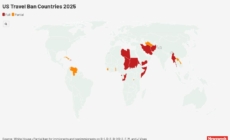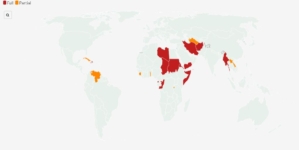-
NFL Legend Dan Marino Fires Shot at Tom Brady - 27 mins ago
-
Tesla Begins Limited Robotaxi Service in Austin - 31 mins ago
-
At least six dead after boat capsizes in Lake Tahoe storm - 36 mins ago
-
Kevin Durant Breaks Silence on Trade to Houston Rockets - about 1 hour ago
-
‘It Felt Like Kidnapping,’ Khalil Says in First Interview Since Release - about 1 hour ago
-
Map Shows US Military Presence in Middle East as Iran Weighs Retaliation - 2 hours ago
-
Persians gather in L.A. restaurant to find solace as war spreads - 2 hours ago
-
‘I Feel Like I’ve Been Lied To’: When a Measles Outbreak Hits Home - 2 hours ago
-
Iranian President Issues New ‘Response’ Warning to US - 2 hours ago
-
Michigan Church Shooting Leaves at Least 1 Injured and Gunman Dead, Police Say - 3 hours ago
Javier Milei Has Been a Disaster for Argentina | Opinion
Just over a year into President Javier Milei’s radical experiment in Argentina, his government boasts of an economic miracle: a record fiscal surplus, a stronger currency, and surging market optimism. But behind these numbers lies a brutal truth. Milei’s program—one of the most austere in history and cheered on by figures of the global far right—is tearing apart Argentina’s social fabric and democratic institutions, leaving millions in deepening poverty and despair.
The cost of this “miracle” is paid by children who go to underfunded schools, pensioners who can’t afford medication, and women escaping domestic violence only to find state-run shelters closed.
The government’s much-celebrated fiscal achievements are funded by gutting institutions meant to sustain human life. Today, more than half of Argentina’s population lives below the poverty line, according to the Catholic University of Argentina. This is a direct result of Milei’s devaluation of the Peso and cuts to government funding. Over the past year, tens of thousands of government workers have been dismissed. Food assistance to tens of thousands of families has been cut off. The Ministry of Women, Genders, and Diversity was eliminated. Education budgets have been slashed by 70 percent in real terms, threatening to shut down iconic public universities like the University of Buenos Aires.
Meanwhile, Milei and other top government officials gave themselves a 48 percent salary increase last year. The government also quietly shipped several tons of gold reserves to the United Kingdom as financial collateral, sparking outrage in a country still haunted by the colonial wound of the Malvinas/Falklands. Sovereignty, it seems, is now a tradable asset.
But beyond this damage lies something more insidious: democratic backsliding. Milei has ruled largely by decree, bypassing Congress to implement sweeping deregulation and privatization. His “Omnibus Law” would have granted him near-dictatorial powers over taxation, natural resources, and the press. When the bill was partially rejected, peaceful demonstrators were met with tear gas, mass arrests, and indiscriminate violence. Among the detainees: journalists, union organizers, even high school teachers.
Milei denies climate change, ridicules social justice, and champions trickle-down cruelty. He insulted the late Pope Francis and whitewashed the 1976–1983 military dictatorship that forcibly disappeared 30,000 people. He publicly promoted a cryptocurrency scam that defrauded thousands of Argentinians and Americans, prompting an active judicial investigation in the U.S. These actions embody his ethos: politics as speculative casino, corruption as global digital spectacle, and contempt for accountability. This is not provocation—it is an ideology that replaces empathy with disdain and treats the state as an enemy to be dismantled.
But Milei didn’t emerge from a vacuum.
The betrayal began with the quiet surrender of his predecessor, Alberto Fernández, whose government cloaked itself in progressive language, but failed to confront the powers that truly govern Argentina: corporate monopolies, foreign creditors, and judicial mafias. While speaking of social justice, it tiptoed around confrontation, appeased the International Monetary Fund, and left millions in poverty. That political cowardice paved the road for something far more brutal.
Milei’s rise was not just a reaction to the economic crisis—it was the product of cultural abandonment. Fernández’s administration lost its soul when it stopped fighting for workers and the marginalized, instead governing for technocrats and PR headlines. It stands as a warning for every country where progressive leadership forgets that dignity is not a marketing strategy—it’s a fight.

Tomas Cuesta/Getty Images
Argentina’s democracy was rebuilt from the ashes of the last civic-military dictatorship. That hard-won social pact is now under siege. Human rights organizations are vilified in government-aligned media. The security minister labels protesters as “internal enemies.” Intelligence agencies have returned to putting union leaders and community organizers under surveillance.
It is no coincidence that Donald Trump praises Milei, Elon Musk promotes him, and Jair Bolsonaro emulates him. Behind this model lies a transnational alliance of libertarian think tanks, financial elites, and far-right agitators who see Argentina as a test case.
And the contagion is already widespread. In Brazil, Bolsonarist factions are seeking revenge. In El Salvador, Nayib Bukele imprisons thousands without trial under the guise of security. In the United States, Trump is back—with a thirst for vengeance.
To those in Washington who view Milei as an ally because of his anti-China rhetoric or market enthusiasm, I ask: at what cost? Ignoring authoritarianism is not only cynical, it will embolden would-be autocrats.
I’ve worked for years in Argentina’s poorest neighborhoods, alongside informal workers, evicted families, and children who rummage through trash to survive. I’ve witnessed priests resist forced evictions, mothers run soup kitchens in the rain, and students drop out of school because they can’t afford transportation. These are not passive victims. They are the country’s moral backbone.
The crisis we face is structural. Land, housing, work, health care, and education are not luxuries—they are basic rights millions in Argentina lack. In response to the failed Milei model, we propose a different system: one rooted in the fair distribution of land to produce healthy food, dignified housing for every family, formal employment through the popular economy, a territorial public health system, and inclusive education.
What we advocate is not charity—it’s justice. It’s not assistance—it’s grassroots power. And it’s not a dream—it’s a roadmap for a nation that belongs to all its people, not just the elite.
Argentina is not yet lost. But its democracy is in grave danger. The libertarian dystopia being tested in our country is one where markets rule and the vulnerable are left to die. We must say no.
Juan Grabois is an Argentine lawyer, social leader, and former presidential candidate. He is the founder of the Movimiento de Trabajadores Excluidos (MTE), working across Latin America in defense of human rights and the popular economy.
The views expressed in this article are the writer’s own.
Source link




















